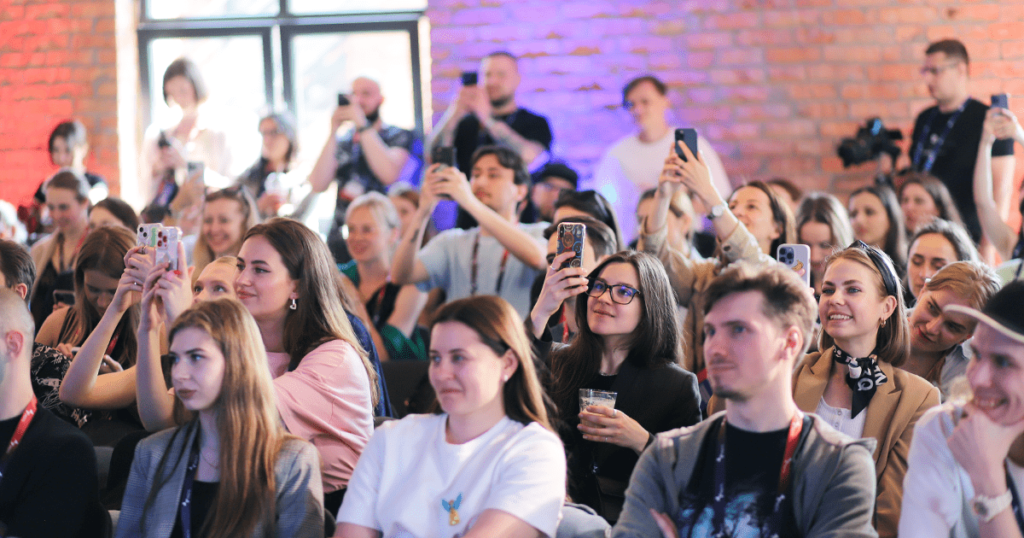On May 25, the second IT Meets conference, organized by the Lviv IT Cluster, took place in Lviv. This time, the event was dedicated to Product, specifically digital design in tech. The conference brought together over a hundred designers from various disciplines, as well as art directors, brand managers, product managers, and everyone interested in design and technology.
The main speakers at IT Meets: Product were Anna Grebneva, Chief Product Officer at LUN, and Volodymyr Smyrnov, Design Director and Partner at Spiilka design büro. Also, experts from service and product companies shared their experiences. How does Artificial Intelligence change the work of a designer? How can a brand avoid clichés when searching for Ukrainian identity? What skills does a digital designer need to reach a new professional level? These were the topics the experts at IT Meets: Product – Design/Future – Users. Competencies. Business discussed.
Volodymyr Smyrnov: “We started searching for our identity as a defensive reaction to the actions of the enemy trying to deprive us of it.”
The Design Director and Partner at Spiilka design büro and the Art Director of Megogo says that as unpleasant as it may be to admit, the full-scale invasion made Ukrainians interested in themselves. Of course, some brands began this journey in 2014, but most started after February 24, 2022.
“The use of blue and yellow colors in branding have become a symbol of solidarity and support. To make it relevant, we should not rely on external attributes like embroidery or Kosiv ceramics. Instead, we should focus on the meaning that design has to bring to the world. This approach will make the design appropriate and long-lasting. I consider working with fonts a safe zone for product design. In this case, we can demonstrate originality and historical continuity but not exploit national themes,” says Volodymyr Smyrnov.
He also proposed characteristics that make Ukrainian design unique and distinctive:
- Gate of Europe
- Aesthetic imperfection
- Absence of continuity
- Variability
- Humor
- Freedom
Oleksandr Valyus: “The demands for designer skills are constantly increasing. Tools change every five years.”
The Head of Product Design at Qubstudio is convinced that a designer will have a professional future by improving research, facilitation, visualization, and adopting new design tools. Additionally, Oleksandr Valyus highlighted the skills that will help designers be prepared for emerging trends in the market:
- Continuous growth: To grow, you need to do what you are asked and what you want to do. Go where you are not allowed.
- Business empathy: It is an important skill when working with clients. It allows designers to find a middle ground instead of “fighting” with the business. Look at the product not only from a design perspective but also from a business standpoint and the opportunities the product opens up. Feel free to shift the focus of design in the process.
- Inquisitiveness: Do not focus solely on design. Expand your horizons beyond the work screen, a few apps on your phone, or familiar websites. For example, play with new toys. Many modern technologies have grown out of toys.
- Paradigm and mindset shift: Do not avoid difficulties just because you do not know how to do something. Embrace challenges and change your attitude towards them.
Digital Design vs Artificial Intelligence: what to prepare for
“It is becoming evident that the hype wave is passing,” says Max Merkulov from Projector Institute. “It is clear that AI cannot perform more complex tasks. I believe that Artificial Intelligence can take on the more routine part of the work but cannot fully replace a designer.”
In this context, Maria Miroshyna, Head of UX and Product Design Practice at N-iX, shared her team’s experience using AI tools in their research. They use ChatGPT for education, user and conversion testing, and identifying user pain points.
“Ask ChatGPT to help you understand or explain something. For example, ask it to explain why the conversion rate is dropping or to develop a scenario for testing. Additionally, ChatGPT can analyze existing algorithms. For instance, ask it about the four main problems with Uber, and it will provide an answer that you can adapt to your product,” notes Maria Miroshyna.
The expert adds that AI tools should be seen as allies. However, when dealing with important and sensitive data, the advantage will always be with humans.
IT Meets is a series of one-day professional events that bring together professionals from different areas of the tech industry to exchange knowledge and network productively.
Partners of IT Meets: Product – Design/Future. Users. Competencies. Business include: QubStudio, Eleks, Just Answer, LinkUp Studio. Media partners of the event are: Cases, Vector, Projector, Ukrainian Digital Community, robota.ua, and Happy Monday.

